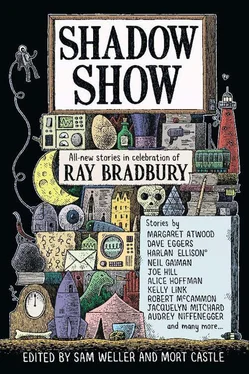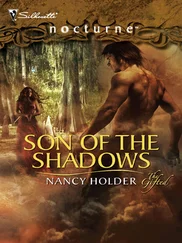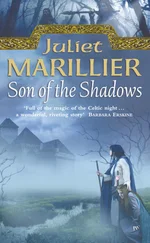I never went to college.
I worked with Dad. When Dad got older, I kept the company and he did the books. The name is the same on the truck, though it’s only me and Sam and my nephew, Karin’s boy Brian Olsky. No more Nickolai boys. I thought I would have sons. And then I had only daughters, five daughters, just like Mr. Finnian did. I keep it the same, though. All my daughters had sons. I have seven grandsons. My daughter Polly went to college for a teacher, but she wants to take over my business, call it Nickolai and Daughter. I don’t think she will, though I would like a family business.
She’s not afraid of anything.
I am.
In that mountain field, I looked the better part of a long summer day and the following morning for the Barlow knife. I knew it was the right place because of Anton’s photos he took when he went back once himself, of this clumber of rocks that looked just like a rowboat and the little birch whip Anton planted over Jackie. It had grown into a tree with fretful arms.
But I never found it.
The nail, I found. What, twenty-five years had passed. It should have been deep under a foot of dirt, what with winter snows and summer mudslides. But it was there, waiting for me. And though I missed Jackie every day, I knew that if I picked it up, all Jackie knew in the shadow of that mountain would fly up into me. I left the nail lie.
Many years later, one of the girls was talking about this band called that: Nine Inch Nails. Sharper than I meant, I asked her did she know what that name meant. One day, in the car, their song come on. Polly turned it up loud. It sounded like someone kicking a pipe organ to death.
I never told a living soul. Only Mama. She tried to make light, but her mouth squirmed helplessly on its own. She made the sign of the cross, the Orthodox cross—head, two hearts, stomach.
It was just chance he got the knife and me the bayonet. Papa didn’t favor either of us boys. What if Jackie got what was meant for me? Wasn’t that nail there—unmarked, uncovered, plain as a judgment? Left alone, all us Nickolais, we live long lives. Polly may call me “Gramps,” but I could have twenty more years. What if your fate got switched with someone so like you in every way it could fool God himself—God or whatever else there is that waits? What if that fate is there still, and knows my given name? It’s like Jackie said. There’s nothing can be done.
About “Two of a Kind”
I Sing Bradbury Everlasting
When I was a very young woman, and Ray Bradbury was already a senior citizen, I was trying to impress a guy I liked by reading a story to his little daughter. The story was called “I Sing the Body Electric!” If you happened to see a charming 1982 TV production that starred Edward Hermann, you might know it as The Electric Grandmother .
The story was more than I bargained for.
Like every child in school, I’d read Dandelion Wine and the short novel The Halloween Tree .
But returning to Ray Bradbury as an adult, I found myself unable to get through “I Sing the Body Electric” in one sitting. And it was not because the little girl, who was about six, was bored. She wasn’t.
It was I.
I wasn’t bored.
I was overcome—first by the writing and then by emotion I couldn’t suppress with my newfound adult authority. I sat in the rocking chair and sobbed, as I did the first time that I read that Charlotte was not only a true friend, but a good writer.
I felt the way you feel when you find something long gone and dear, something lost for so long you’ve forced yourself to forget how wonderful it was, so you didn’t yearn for it.
I had forgotten just how good Ray Bradbury was. I had forgotten how subtle and deceptive were his stories, like Betty Smith’s A Tree Grows in Brooklyn and Harper Lee’s To Kill a Mockingbird , riven with the kind of fierce mysteries that adults like to pretend don’t exist.
If you don’t know it, “I Sing the Body Electric!” is the story of a widowed father who takes his children to a factory to assemble a robot nanny for them, a perfect grandmother. And as for perfection, it was, and is, simply one of the most perfectly pitched and moving stories I’ve ever read. Eventually, as children will (witness Toy Story 3 ), the little ones outgrow their need for the granny who can spin kite string from her fingertips. But when they are old, their father gone and their own children adults, and have become frail, those same children return to find their electric grandmother as loving and spry as ever.
Later the same week, I read again to the little girl. The story was The Homecoming , the tale of the Halloween-night party that annually reunites an extended family composed of pre- Twilight vampires, werewolves, and shape-changers of all descriptions, much to the excitement and grief of Timothy, the youngest child, who is disabled, a mutant. Timothy has the misfortune of having been born human.
At the end of the story, Timothy’s mother (the original Morticia Addams) comforts him. Should he die, she promises, all of them will visit him every year on the Homecoming, and tuck him in, all the closer.
If I’d been moved before, now I was undone. Ray Bradbury’s writing is sentimental in the sense that Steinbeck’s is, but it’s never syrupy. It’s simply the iteration of honest human emotions we can neither outrun or deny.
My relationship with that little girl’s dad was not destined to last. He must have thought I was a sissy. Oh, well.
I soon wrote to Ray Bradbury.
This was so long ago that, in the newsroom where I worked, I still had a typewriter next to my computer (which was the size of a commercial oven). What I wrote, I can’t recall. I only know I went on and on. I’m sure I said that I hoped perhaps one day I could write something with such strange inventive terror and tenderness.
You must imagine the face of the clerk in the big newsroom who, a few weeks later, brought me an envelope drawn all over with dragons and witches, and castles shadowed by dark wings, and shuddering, beckoning trees, and bats with the eyes of shiny dimes.
It was addressed only “TO JACQUELYN MITCHARD, A VERY GOOD WRITER INDEED.”
Again, I burst into tears.
That was the beginning of a correspondence and a friendship that has lasted thirty years, and quite a number of letters, and several dinners together. Once, when the great man was in a city nearby (as an expert on vampires, he was addressing a national convention of dentists), I arrived laden with books, one to be signed for each of my (then) six children.
“I know who you are!” he said with a tolerant laugh, and we talked about many things—my hope that The Homecoming would one day be a film and how Mr. Bradbury’s growing up in the era that Ronald Reagan was growing up in Dixon, Illinois, was very good preparation for writing The Martian Chronicles .
That was the thing of it, Mr. Bradbury said.
The reason that Rod Serling and some few others succeeded with a very specific kind of science fiction and horror (and this is also true for other heirs, notably Stephen King) was that they saw the manifest and immense oddities in daily life. And they asked, Why not? Who would not want a grandmother who never tired of playing and never left you alone, whose feelings could never be crushed—even when you didn’t need her? Who would not grieve for a child born into a family of bloody immortals, whose fate was mortality? What kind of human being would want an alien species’ child, born of Venus, as a pet? (We have the answer to that in the stories of people who buy and try to raise chimpanzees, who, as surely as we, are people—although not human people.)
Читать дальше



![Lord Weller - Ритера или опасная любовь [СИ]](/books/421202/lord-weller-ritera-ili-opasnaya-lyubov-si-thumb.webp)








